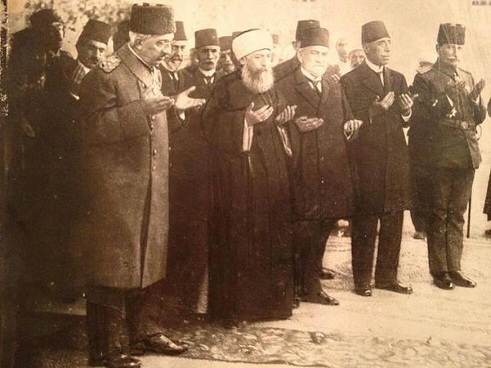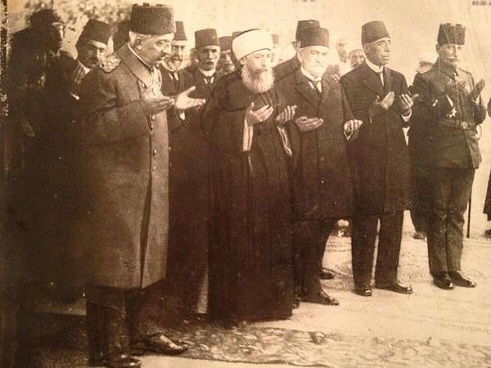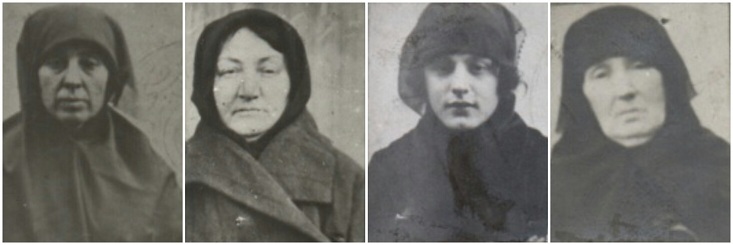
THE OTTOMAN DYNASTY AND PIETY
In the past century, there were significant changes in the organization and protocol of the palace, and important changes also occurred in the lives of the palace residents. Today, some people question, looking at the outward appearance of certain dynasty members, saying, "How can the grandchildren of the Caliph be like this?"
The truth is that Ottoman sultans, the dynasty, and palace residents were devout. Throughout history, the Ottoman palace has not been a place where scandals occurred. A life deeply rooted in religion and traditions within the seriousness of a madrasa and the dignity of a Sufi lodge has been maintained. No Muslim state dynasty in history can be compared to the Ottoman dynasty and palace in this regard.



I Do Not Forgive!
In the palace, whether male or female, there was no one who did not perform prayers or observe fasting. Palace women, even if they were concubines, strictly adhered to full hijab. Regardless of how they dressed in the harem, they would not go outside without wearing a ferace. A ferace is a two-piece garment consisting of a loose and long outerwear, similar to a headscarf and a coat.
Photos of palace residents without hijab should not deceive people. These photos were taken inside the palace and are private. During that era, concubines were not obligated to comply with the Sharia in terms of purdah, so they would teach photography to one who was talented among them. This person would then take pictures of the palace residents as needed. It is known that women were not obligated to cover themselves among themselves. All passport photos of the exiled dynasty's ladies and servants are in full Islamic cover, including the veil and face cover.
The wife of Sultan Abdulhamid II, Behice İkbalefendi, says, "There was no one in the palace who did not pray. Without exception, everyone prayed. Some foreigners who could not speak the language, when they entered service, were obliged to memorize at least enough verses and the fundamentals of the Islamic religion to perform prayers."
In the memoirs of the palace teacher Safiye Ünüvar, it is mentioned that during the reign of the constitutional monarch Sultan Mehmed V Reshad, he said, "There were two good things in the palace: prayers and meals. Now both have deteriorated," and he had "I do not forgive those who do not pray" written on the door of each palace room. The last Sultan, Mehmed VI Vahdeddin, and the last Caliph, Abdulmejid II, used to perform their five daily prayers.


Exile in One Night
After Sultan Abdulhamid II, during the era of the Young Turks who seized power, social life underwent a serious deformation. The practice of hijab and purdah weakened; religious publications decreased; the role of scholars in society was restricted; religious civil servants and officers fell out of favor. This degradation certainly affected the palace as well.
Nevertheless, some individuals lived uncompromisingly, while others continued both lifestyles. This duality, fluctuating between Eastern and Western influences, is a characteristic of Ottoman social life during that era and continues to exist today. Since the constitutional period, not only in the palace but also outside, even among religious figures, a weakening of religious life can be observed.
People who had never set foot outside the palace in their lives were deported overnight with no money. To sustain their lives abroad, some resorted to street vending, begging, and some even died of hunger. Religious life requires order and security.
The dynasty has never been able to find such an environment abroad. Only a few managed to survive among non-Muslims. In Bagnoles, an English aristocrat lawyer proposed to Princess Nermin Sultan, the daughter of Prince Mahmud Şevket Efendi, but she firmly rejected him. Meanwhile, they didn't even have anything to eat.
The dynasty members with non-Muslim mothers, especially if they are separated from their fathers, grandfathers, and grandmothers, cannot be expected to receive religious upbringing. The members of the dynasty have experienced an undeserved exile and endured a lot of pain.
However, considering that many children of religious scholars in Turkey have lost their connection to religion, it is necessary to understand with empathy the situation of dynasty members who live their lives in Europe. The cause and responsible party are not themselves; rather, those who put them in this situation.
Therefore, no one, especially those who collectively exile these people and condemn them to poverty, and who easily prefer to abandon religious practices themselves, should have the right to speak about the religious lifestyle of the dynasty. In the end, actions are subjective qualities related to a person's inner world. Allah will hold them accountable. Perhaps, this is what the regime wanted. The dynasty should not have been a hope in the future for the people.
Kenize Murad, the granddaughter of Hatice Sultan, gave the following response to a journalist in London in 1987, who asked her about not resembling a Muslim Turk in appearance and then regretted asking: "I didn't know my mother and father. I grew up in an orphanage under the care of nuns. Shame on those who brought us to this state. But I can say this: Alhamdulillah (Thanks Allah), I am a Muslim, and I am following the path of my ancestors."

Most Importantly, I Am a Muslim!
Journalist and public relations specialist Betül Mardin, who spent her childhood in Egypt, recounted, "While living in Cairo, we would often meet with members of the dynasty. None of them were living such a comfortable life; they were getting by in one way or another. But they were a very dignified family. They had no vulgar behavior at all."
Yes, today there are very few members of the dynasty who are overly pious. However, the rest are people with strong beliefs. None of them has an attitude of opposition or questioning towards religion. On the contrary, as members of an honorable dynasty, they uphold their religious identity. This alone is significant. This means that if the conditions were favorable, these individuals would undoubtedly present a scene befitting the Ottomans whose name they bear.
If Sharzade Ali Vasıb Efendi had continued in the line of succession, he would have become both the sultan and caliph. When asked how his free-spirited lifestyle would align with the title of caliph, his son Osman Selahaddin Efendi gave the following response, "If my father had assumed that position, there was no doubt that he would have fulfilled the duties of that position. My father regularly taught me Ottoman history and the Islamic religion."
Indeed, in his advice to his son, Ali Vasıb Efendi says, "One should be respectful and loyal to their homeland, religion, history, family, and parents... Inshallah (Allah willing), you will always be fortunate by relying on Allah in every way. Amen." These lines are a manifestation of strong faith.

When Şadiye Sultan, daughter of Sultan Abdulhamid II, speaks about her daughter in her memoirs, she says, "Ensuring her strong connection to Allah with great faith and instilling the greatness of the Islamic religion into the depths of her soul became a great duty for me. The love of Allah, fear of Allah, and trust in Allah that I instilled in her heart when I had to leave her alone to face unfamiliar surroundings with her own fate became the most precious thing I could give her."
Armenian auctioneer Yervant Portakal's heir Raffi Portakal says in an interview (August 14, 2023, Türkiye): "My grandfather was a respected and beloved art dealer. He mainly conducted auctions for the mansions and villas of the Ottoman dynasty members who were mostly sent into exile. My father continued this. I have also met many sultans. I am from the 1968 generation; I do not idealize dynasties. However, most members of the Ottoman dynasty had a glow on their faces. They have faced many difficulties, but I never felt those hardships in their words or on their faces."
The following sentence expressing the feelings of young prince Selim Süleyman Efendi is noteworthy: "I was born and raised in England, but I am Turkish. Moreover, I am Ottoman; the blood of Osman Ghazi runs through my veins. But most importantly, I am a Muslim."

Önceki Yazılar
-
WHO CAN FORGIVE THE KILLER?31.12.2025
-
WHEN WAS PROPHET ISA (JESUS) BORN?24.12.2025
-
IF SULTAN MEHMED II HE HAD CONQUERED ROME…17.12.2025
-
VIENNA NEVER FORGOT THE TURKS10.12.2025
-
THE FIRST UNIVERSITY IN THE WORLD WAS FOUNDED BY MUSLIMS3.12.2025
-
WHO BETRAYED PROPHET ISA (JESUS)?26.11.2025
-
IT HAS BEEN MORE THAN 100 YEARS SINCE ITS ABOLITION, BUT... IS THE CALIPHATE BEING REESTABLISHED?19.11.2025
-
GREETINGS TO YOU, O OTTOMAN SANJAK!…12.11.2025
-
ROTHSCHILDS BROUGHT THE END OF THE OTTOMAN EMPIRE!5.11.2025
-
SHEIKH BEDREDDIN, SON OF THE QADI OF SIMAVNA29.10.2025